|
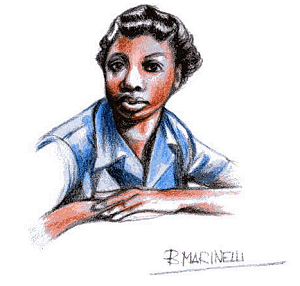
"If I had to be called something, it should have been
a folk singer, because there was more folk and blues
than jazz in my playing".
[…] Mainly it defined her as sui generic. But if you need a label, try this
one: Freedom Singer".
Here is what David Marsh writes in the preface of Nina Simone's
autobiography "I Put a Spell On You" a few days after she passed away.
Her real name is Eunice Kathleen Waymon and she was born in Tryon,
North Carolina in 1933, the sixth of eight children.
Her mother is a Methodist elder (one of the Saints) in a Baptist church, her father
changes a variety of jobs: barber, truck driver, cook, but the Depression in
1929 has serious consequences in Nina Simone's
family, above all because Tryon is resort town and visitors cannot afford a trip
to the mountains anymore.
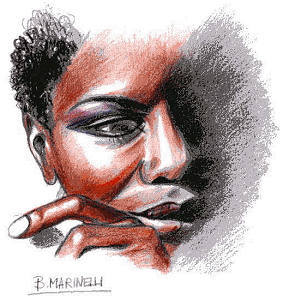 In
spite of poverty in a numerous family, Nina's memories of her childhood are happy
and tied up with food and music: "My first memory is of my mother's singing.
When she was around the house she sang all the time, in a high, trilling voice.
She sang the same songs she'd sing at Bible meetings and they became the soundtrack
to my infant life "I'll Fly Away" and "If You Pray Right" or Heaven Belongs to Me".
While she baked she would sit me up on the counter top and give me an empty jam-jar
to cut out the biscuit shapes in the dough, singing all the while". In
spite of poverty in a numerous family, Nina's memories of her childhood are happy
and tied up with food and music: "My first memory is of my mother's singing.
When she was around the house she sang all the time, in a high, trilling voice.
She sang the same songs she'd sing at Bible meetings and they became the soundtrack
to my infant life "I'll Fly Away" and "If You Pray Right" or Heaven Belongs to Me".
While she baked she would sit me up on the counter top and give me an empty jam-jar
to cut out the biscuit shapes in the dough, singing all the while".
Nina starts to play the piano at an early age, also because music in her
family in a daily routine: her father plays the guitar and harmonica and leads the
choir in a church, her mother plays the piano and sings, her brothers and sisters
all play the piano and sing in the church choir or in smaller gospel and blues groups.
It is thanks to her early talent that she soon becomes the official pianist
in her church at only six years old. Holy music will teach her improvisation and
rhythm, two essential musical elements for her musical training: "Church taught
me rhythm, and it's been a vital part of my music ever since. I liked the music
in the Holiness church most of all. Their prayer meetings were one great commotion,
with people testifying and shouting all night. The music that went along with it
had incredible rhythm, it sounded like it came straight out of Africa. […] Women
would have to go to hospital sometimes, they got so transported".
Mrs Miller, the woman where Nina's mother works as a housemaid, realizes
how much talented the little girl is and decides to pay for her to have lessons
for a year, just to help Nina who could not afford piano lessons. The tutor is an
Englishwoman who has moved to Tryon with her Russian husband, a painter. Her name
is Muriel Massinovitch. Her home, the pictures, classical music, the flowers
put a spell on the little child Nina. The reality she discovers little by little
is so different from all she has known so far. Bach seems so complicated to her,
that she needs time to relax and feel at ease, but as she practices she soon realizes
that his music his perfect: "Each note you play is connected to the next note,
and every note has to be executed perfectly or the whole effect is lost. Once I
understood Bach's music I never wanted to be anything other than a concert pianist;
Bach made me dedicate my life to music and it was Mrs Massinovitch who introduced
me to this world. I had set out on a journey which became more wonderful and thrilling
each week".
At eleven years old during a recital in her local town hall, Nina is compelled
to witness a scene, which she will never forget: while she is sitting at the piano,
she looks up at her parents, who are being thrown out of their front row seats,
in favour of a white family.
If anyone expects to hear her play they'd better make sure that her family
is sitting right there in the front row where they could see her. It's her first
public protest. Her parents are embarrassed, but they move back.
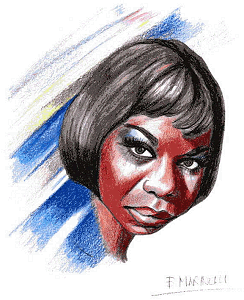 In
the final year of her high school, she attends the Juillard School, just to prepare
for the scholarship examination to the Curtis Institute of Music in Philadelphia.
She takes the examination, but she does not pass it. "When I was rejected by
the Curtis Institute it was as if all the promises ever made to me by God, my family
and my community were broken and I had been lied to all my life". In
the final year of her high school, she attends the Juillard School, just to prepare
for the scholarship examination to the Curtis Institute of Music in Philadelphia.
She takes the examination, but she does not pass it. "When I was rejected by
the Curtis Institute it was as if all the promises ever made to me by God, my family
and my community were broken and I had been lied to all my life".
She starts to give private lessons and she manages to scratch a living,
but when she comes to know that one of her students plays the piano in a bar in
Atlantic City and earns ninety dollars a week (it is double what she earns), she
decides to try herself. She gets the number of the agent and calls up. She has the
job for the following summer. Nina realizes that what she is going to do is in contrast
with the religious experience she has been brought up, and she is compelled to find
a stage name, to avoid her mother's religious disapproval of playing in a bar.
"I'd had a Hispanic boyfriend one time, Chico, who had christened me Nina,
which was the Spanish name for "little one". Chico had called me that all the time,
and I really loved the way it sounded, And I liked the name Simone too, ever since
I'd seen Simone Signoret in those French movies".
She starts to play at the Midtown bar in 1954.
The first night she must play from 9.00p.m.to 4.00 a.m., with a break of fifteen
minutes every hour. She is very excited and she decides to combine classical pieces
and popular tunes, improvising on the music:
"So that first night I closed my eyes and played".
At the end of the night, the owner of the bar asks her why she hasn't
sung. When she answers: "I'm only a pianist", he coldly replies
"Well tomorrow night you're either a singer or you're out of a job". This is
a new start in her career as a singer.
Towards the end of her first week at the Midtown, more and more new customers
arrive to listen to Nina playing and singing.
She gets some gigs in other clubs near Philadelphia but it's time to move
to New York. The jazz scene is the Greenwich Village. In
1958 she records her first album "Little
Girl Blue" but it's "I Loves You Porgy"
by Gershwin that becomes an instant hit. Her dream of becoming a classical pianist
fades away, but in New York she is "the hot new thing".
In 1960 she gets married with Andy
Stroud a former police detective who becomes her recording agent. In
1962 their daughter Lisa Celeste is born.
In the '60s, Nina Simone is
part of the civil rights movement and later the black power movement. In new York
she is, for a period, "The Queen of the Village", and the cultural atmosphere and
its protagonists are described like this: "There was the jazz scene, with guys
like John Coltrane,
Art Pepper, George Adams and many more just walking about the place
looking for fun and a place to play, which would be a club if they had a paying
date, or a loft somewhere if they just wanted to blow. Surrounding them, gravitating
around the music, were the writers, poets and painters, remarkable men and women
who would become my friends. Langston Hughes, Jimmy Baldwin, Leroi
Jones - as Amiri Baraka was known then - Lorraine Hansberry,
Godfrey Cambridge, Dick Gregory - so many talented and exciting people".
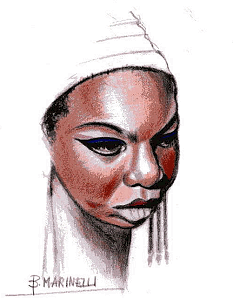 Nina
Simone writes "Mississipi Goddam" after
the bombing of a Baptist church in Alabama in 1963
killed four little black girls. She is dramatically moved by the attack which takes
place less then three weeks after the March on Washington and marks a turning point
in her involvement in the civil right activism. The song is not often played on
the radio, but Nina Simone introduces it in her live performances. Nina
Simone writes "Mississipi Goddam" after
the bombing of a Baptist church in Alabama in 1963
killed four little black girls. She is dramatically moved by the attack which takes
place less then three weeks after the March on Washington and marks a turning point
in her involvement in the civil right activism. The song is not often played on
the radio, but Nina Simone introduces it in her live performances.
It's in memory of Lorraine Hansberry, the Afro-American playwright who
prematurely died at the age of 34, that Nina Simone writes the song "To Be Young
Gifted and Black". It is Lorraine who has started off her political education and
through her she starts thinking about herself as a black person in a country run
by white people. The title of the song is taken by the homonymous play written by
Lorraine Hansberry.
To be young, gifted and black,
Oh what a lovely precious dream.
To be young gifted and black,
Open you heart to what I mean.
In the whole world you know
There are a billion boys and girls
Who are young gifted and black,
And that's a fact.
With the song "Four Women", Nina
Simone introduces a portrait of Black femininity that speaks to various intersections
of race, colour, caste, sexuality and gender. The four characters of the song, Aunt
Sarah, Saffronia, Sweet Thing and Peaches, soon become the anthem of the Afro-American
feminist movement.
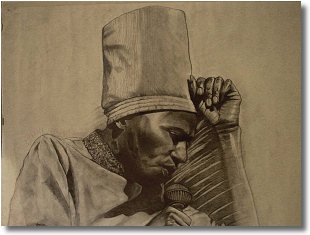 Nina
Simone's growing bitterness over American racism, her disputes with the record
companies, her troubles with the IRS, make her decide to leave the USA. First she
moves to Barbados and then, to Liberia (Mother Africa), with the encouragement of
her colleague-friend Miriam Makeba. She has met the great South African performer
some time before. Here is her impression, after Nina has reached her in the backstage
during a concert of Miriam Makeba in the States: "A few months earlier
I'd seen her show at the Blue Angel, went backstage to say hello, and within a few
minutes we felt we'd known each other all our lives. Miriam told me she'd heard
my records on the radio in South Africa at the end of the fifties –which astonished
me- and had wanted to meet me ever since. I loved her music the moment I heard it,
but once I knew her I loved her more. It was her attitude I liked more than anything;
she was so straightforward in what she said and thought, and at the same time so
relaxed so African…." Nina
Simone's growing bitterness over American racism, her disputes with the record
companies, her troubles with the IRS, make her decide to leave the USA. First she
moves to Barbados and then, to Liberia (Mother Africa), with the encouragement of
her colleague-friend Miriam Makeba. She has met the great South African performer
some time before. Here is her impression, after Nina has reached her in the backstage
during a concert of Miriam Makeba in the States: "A few months earlier
I'd seen her show at the Blue Angel, went backstage to say hello, and within a few
minutes we felt we'd known each other all our lives. Miriam told me she'd heard
my records on the radio in South Africa at the end of the fifties –which astonished
me- and had wanted to meet me ever since. I loved her music the moment I heard it,
but once I knew her I loved her more. It was her attitude I liked more than anything;
she was so straightforward in what she said and thought, and at the same time so
relaxed so African…."
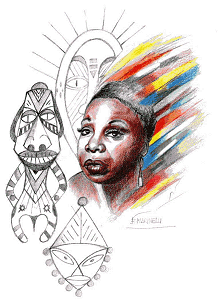 She
settles in Monrovia with her daughter, and she is welcomed as a star. She is soon
part of the most notable circles of the town. In Africa she feels like home, leaving
behind all the troubles of her past life: "I wouldn't have believed it before
I arrived, but Liberia did feel like home and I loved everything about it. I loved
the way it took two hours to drive the three miles into town during the rainy season,
when the road down to the beach turned to mud and the rain beat so hard on the windscreen
you couldn't see past the wipers […] and I loved the parties, the fun, the palm
wine. Liberia was a release; after all those years of being a wife, mother, activist
and star all the time I was just a mother with her child happy in school and nobody
looking over my shoulder telling me what to do". She
settles in Monrovia with her daughter, and she is welcomed as a star. She is soon
part of the most notable circles of the town. In Africa she feels like home, leaving
behind all the troubles of her past life: "I wouldn't have believed it before
I arrived, but Liberia did feel like home and I loved everything about it. I loved
the way it took two hours to drive the three miles into town during the rainy season,
when the road down to the beach turned to mud and the rain beat so hard on the windscreen
you couldn't see past the wipers […] and I loved the parties, the fun, the palm
wine. Liberia was a release; after all those years of being a wife, mother, activist
and star all the time I was just a mother with her child happy in school and nobody
looking over my shoulder telling me what to do".
Two years later the African experience comes to an end. Nina Simone
and her daughter move to Switzerland, to provide a better education for Lisa
Celeste who is growing up. In spite of the many fans that recognize her on the
street and wave and say hello, she feels a terrible loneliness and nostalgia for
Africa. "After Liberia,however, it took a while getting used to white faces,
and it took even longer for me to stop reacting to events andpeople like I had in
Africa. I had to keep in reminding myself I was back in Europe, where people are
repressed an reserved…".
A first attempt for a new start in her musical career, will be disastrous:
she has put her faith in a sponsor who turns out to be a violent man who robs and
beats her, abandoning Nina Simone unconscious in a London hotel. In this moment
of desperation she tries to commit suicide, but fortunately it fails and little
by little she finds her faith in the future: Nina builds again her career slowly,
starting a new series of tournées in Europe.
When a British commercial for Chanel uses her "My
Baby just Cares for Me", the song becomes instantly a hit in Europe.
She tried to pursue fame in her native land, but it is France which is her adopted
homeland.
She spends the last part of her life at Carry-sur-Seine near Marseille,
where she passes away at the age of seventy on 21st April
2003.
"There's no other purpose, so far as I'm concerned, for us except to reflect
the times, the situations around us and the things we're able to say through our
art, the things that millions of people can't say. I think that's the function of
an artist and, of course, those of us who are lucky leave a legacy so that when
we're dead, we also live on…" (N. Simone).
And. she did, her way.
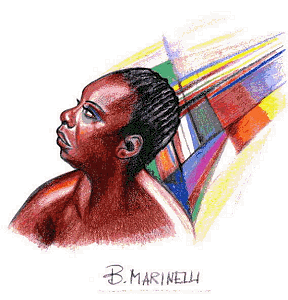
Insert an opinion
|
© 2000 - 2025 All the material published on Jazzitalia is exclusively owned by the author. Moreover it is protected by International Copyright, so it is forbidden any use of it which isn't authorised by the rights' owner.
|
This page has 10.759 hits
Publishing Date: 15/10/2006

|
|

